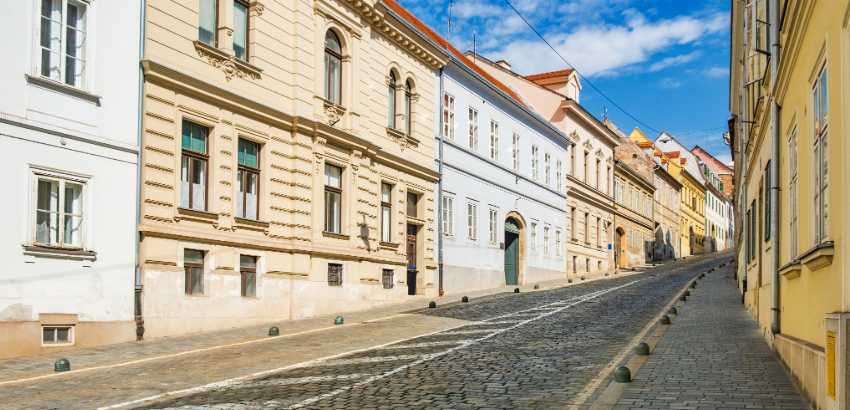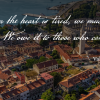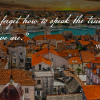
Published: August 2002
View the Original Newsletter: Iskra-110.pdf
About This Issue
Iskra No. 110 captures a quieter, more contemplative tone as Valentina Krčmar steps back from politics to reflect on the importance of gratitude, honesty, and faith. The issue was published in the lingering heat of August 2002 — a month filled with both summer joy and unease about Croatia’s uncertain direction.
Valentina’s writing carries traces of weariness after years of advocacy, but her moral clarity remains intact. She writes less like a journalist and more like a teacher and friend, speaking directly to her readers’ hearts.
Editorial: “On Gratitude and Self-Reflection”
Valentina opens with a meditation on gratitude — a virtue she fears is disappearing from public life. She contrasts the selflessness of those who built Croatia with the entitlement and bitterness of those now enjoying its peace.
“How quickly we forget who stood in the cold, who gave without asking. And yet, we all wish to be thanked for our smallest effort.”
She urges readers to pause, reflect, and express appreciation — not only for material blessings but for kindness, friendship, and the sacrifices of others. Her words have a distinctly pastoral tone, like a letter from an older sister reminding her community not to lose its humanity amid daily frustrations.
Motrišta: “Where Is Our Moral Compass?”
In this column, Valentina tackles the question of moral consistency in Croatian society. She laments the selective outrage of public figures who condemn corruption only when it benefits them to do so. Drawing from recent political scandals, she observes how easily the same individuals shift blame, justify lies, and forget promises.
“We cannot build a nation on double standards. Right and wrong are not matters of convenience.”
She compares Croatian politics to a mirror in which citizens must also see themselves — suggesting that the same complacency and self-interest she criticizes in leaders can be found in daily life as well.
Her conclusion is an appeal for personal responsibility:
“The true change we seek will not come from Zagreb, Brussels, or Ottawa — it will come from the quiet decisions made in our own homes.”
Community and Diaspora
This issue celebrates the spiritual and cultural life of Croatians in Canada.
-
Reflections on the visit of Pope John Paul II continue, focusing on how his presence renewed faith among the youth and brought Croatian pilgrims from around the world to Toronto.
-
Updates from Croatian parishes in Oakville, Norval, and Kitchener highlight upcoming concerts, folklore events, and charity gatherings.
-
A small feature praises the Croatian Folklore Ensemble “Croatoan” for its dedication to preserving traditional dance and costume.
Valentina commends the quiet, steady work of these cultural volunteers, calling them “the keepers of our collective memory.”
Politics and Society
Though less fiery than past editions, the issue still touches on current affairs:
-
Prime Minister Račan’s continued political struggles and the erosion of public trust.
-
Debate over war crimes trials in The Hague and their impact on Croatia’s image abroad.
-
Reports of widespread cynicism among youth, many of whom see emigration as their only hope for a better life.
Valentina’s response is both empathetic and firm:
“To leave is a right; to stay is a responsibility. But whether we live here or there, our homeland still lives in us.”
Health & Lifestyle
Dr. Darko Desaty offers advice on healthy sleep habits and the connection between rest, stress, and heart health. His piece blends practical medical insight with encouragement for readers to treat self-care as a moral duty, not a luxury.
In the culinary section, Višnja Milas Matutinović shares recipes for šnenokle and paprikaš od piletine, both presented as “comfort foods for weary souls.”
Arts & Poetry
This issue features a particularly heartfelt poem by Jure Kaštelan, reflecting on the endurance of hope and identity. It is paired with children’s poems celebrating the end of summer, laughter, and homecomings.
Valentina also includes a nostalgic essay titled “The Sound of Bells,” describing how church bells in small Croatian villages still mark the rhythm of life — births, weddings, and farewells — connecting generations across oceans.
Closing Words
The issue ends with a quiet, personal reflection. Valentina writes about finding peace not in grand gestures but in daily acts of decency and love:
“Every thank-you, every shared meal, every honest word — these are the small miracles that keep a nation alive.”
Her message feels like a gentle pause — a moment of rest between storms, both political and personal.




